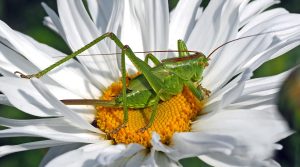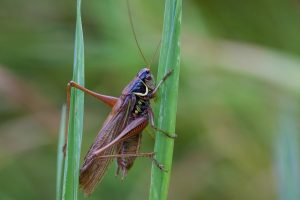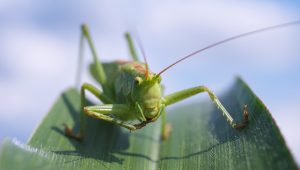Grasshoppers are ubiquitous insects found in fields, gardens, and parks around the world. Depending on where you live, you might have heard various stories and superstitions about grasshoppers, such as their ability to predict the weather, bring good or bad fortune, or serve as a tasty snack in some cuisines. However, one of the most common questions people ask about grasshoppers is whether it’s bad luck to kill them. This question has different answers depending on the context, culture, and purpose of the act. In this article, we’ll explore the various beliefs and interpretations of killing grasshoppers, as well as the ecological implications of controlling their populations.
Contents
 Grasshopper Symbolism and Cultural Beliefs
Grasshopper Symbolism and Cultural Beliefs
Grasshoppers have long captured the human imagination and have been endowed with various symbolic meanings across different cultures. These symbolic associations often shape the attitudes and beliefs surrounding the act of killing a grasshopper. Let’s delve into the diverse cultural interpretations and their influence on human behavior.
- Symbolic Meanings:
Grasshoppers have been associated with a range of symbolic meanings, including:
- Good luck and abundance: In some cultures, grasshoppers are considered harbingers of good fortune and abundance. Their presence is believed to signal the arrival of wealth, prosperity, and favorable outcomes. For instance, in Japanese folklore, a grasshopper landing on a person is seen as a sign of impending fortune.
- Intuition and sensitivity: Grasshoppers are also associated with intuition, sensitivity, and adaptability. They symbolize the ability to make quick decisions and leap into action when necessary. This symbolism highlights the importance of being attuned to one’s instincts and adapting to changing circumstances.
- Cultural Beliefs and Attitudes:
Cultural beliefs significantly influence attitudes toward killing grasshoppers. The interpretations and associations with luck, both good and bad, shape people’s perceptions and actions. Here are some examples:
- Good luck: In Chinese culture, grasshoppers are often seen as symbols of good luck and are included in many traditional good luck charms. Their presence is believed to bring prosperity and positive outcomes.
- Bad luck: On the other hand, in certain cultures, grasshoppers are associated with negative connotations. They are seen as signs of impending doom or misfortune. Killing a grasshopper in such cultures may be viewed as inviting bad luck or negative consequences.
- Influence on Attitudes towards Killing:
Cultural beliefs play a pivotal role in shaping attitudes toward killing grasshoppers. Those who associate grasshoppers with good luck may be hesitant to harm them, as they believe it could potentially disrupt the positive energies or fortunes associated with these insects. Conversely, individuals who perceive grasshoppers as symbols of bad luck or pests may be more inclined to kill them as a means of protecting themselves, their crops, or their gardens.
It is important to note that attitudes toward killing grasshoppers vary widely among individuals, even within the same culture. Personal beliefs, values, and the specific context in which encounters with grasshoppers occur also contribute to these attitudes.
 Superstition vs. Scientific Evidence
Superstition vs. Scientific Evidence
When it comes to the question of whether killing a grasshopper is bad luck, it is crucial to differentiate between superstition and scientific evidence. While cultural beliefs and superstitions may attribute luck to certain actions, scientific understanding provides a more rational and evidence-based perspective on the matter.
- Lack of Scientific Evidence: Scientific research and evidence do not support the notion that killing a grasshopper inherently brings bad luck. Luck, in the traditional sense, is not a scientifically measurable concept. It is important to distinguish between cultural beliefs and objective scientific findings when discussing the luck associated with killing grasshoppers.
- Rational Explanations: The belief in the luck associated with killing or sparing a grasshopper often stems from cultural traditions and folklore rather than empirical evidence. It is essential to recognize that these beliefs are subjective and rooted in cultural interpretations rather than scientific validation.
- Balancing Cultural Beliefs and Scientific Understanding: While scientific evidence does not support the concept of inherent bad luck, it is essential to approach this topic with cultural sensitivity. Cultural beliefs and traditions hold significance and influence individual and collective behaviors. Balancing cultural beliefs with scientific understanding allows for a respectful and comprehensive approach to the topic.
By acknowledging and respecting cultural beliefs, individuals can appreciate the diverse perspectives and symbolic meanings attached to grasshoppers. At the same time, integrating scientific knowledge fosters a more informed and nuanced understanding of the ecological role of grasshoppers and the impact of their control methods.
It is worth noting that personal beliefs and values may differ, and individuals have the freedom to interpret and act based on their own perspectives. By engaging in open-minded discussions that embrace both cultural beliefs and scientific understanding, we can cultivate a broader understanding of the topic while fostering mutual respect and appreciation for diverse viewpoints.
Balancing Beliefs and Environmental Considerations
When it comes to the question of killing grasshoppers and its associated beliefs, it is essential to strike a balance between respecting cultural perspectives and considering the environmental impact. By recognizing the ecological significance of grasshoppers and exploring alternative pest control methods, we can foster a more harmonious and sustainable approach.
- Respecting Cultural Beliefs: Cultural beliefs and traditions surrounding grasshoppers hold deep meaning for many communities. It is crucial to respect and acknowledge these beliefs as an integral part of cultural heritage and identity. Respecting diverse perspectives allows for cultural diversity to thrive while promoting mutual understanding and appreciation.
- Ecological Significance of Grasshoppers: Grasshoppers play a vital role in ecosystems. Their feeding habits help regulate plant growth and maintain ecological balance. Recognizing their ecological significance is crucial for understanding their role within the broader web of life. By appreciating the interconnectedness of species and ecosystems, we can cultivate a deeper respect for all living beings.
- Alternatives to Indiscriminate Killing: Indiscriminate killing of grasshoppers can have unintended consequences for the environment. Instead of resorting to wholesale eradication, Integrated Pest Management (IPM) techniques offer a more sustainable and targeted approach. IPM combines various methods, such as cultural practices, biological controls, and judicious use of pesticides, to manage pest populations while minimizing harm to beneficial insects, including grasshoppers.
Implementing IPM techniques involves:
- Monitoring and early detection: Regularly inspecting crops and gardens to identify grasshopper populations and assessing the need for control measures.
- Cultural practices: Employ methods like crop rotation, physical barriers, and habitat manipulation to reduce grasshopper damage.
- Biological controls: Encouraging natural predators such as birds, spiders, and insects that feed on grasshoppers, thereby promoting natural balance.
- Targeted pesticide use: If necessary, use pesticides selectively and responsibly, considering their potential impact on non-target organisms and the environment.
By adopting IPM strategies, individuals can manage grasshopper populations effectively while minimizing negative environmental impacts.
Finding a balance between cultural beliefs and environmental considerations is key to promoting sustainable practices. It involves fostering dialogue and understanding among different perspectives, acknowledging the value of cultural heritage, and integrating scientific knowledge and ecological principles into decision-making processes.
Ultimately, by embracing a balanced approach that respects cultural beliefs and values while considering the ecological significance of grasshoppers, we can create a more harmonious and sustainable coexistence with the natural world.
 So, Is it Bad luck to kill a Grasshopper?
So, Is it Bad luck to kill a Grasshopper?
In conclusion, the question of whether killing a grasshopper brings bad luck is surrounded by diverse cultural beliefs. However, it is important to note that scientific evidence does not support this notion. Striking a balance between cultural beliefs and ecological considerations is essential.
By respecting cultural beliefs and embracing scientific understanding, we can approach the topic with an open mind. It is crucial to adopt environmentally friendly pest control methods, such as Integrated Pest Management (IPM), which considers the ecological significance of grasshoppers while managing their populations responsibly.
Let us foster a harmonious coexistence with nature by appreciating cultural diversity, promoting sustainable practices, and finding alternative pest control methods that protect both crops and the environment.
Want to know about Baker Creek seeds racist controversy? Read it here.





